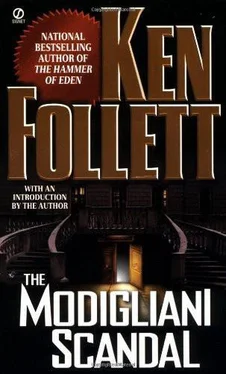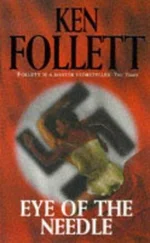They looked at the old man in astonishment. Mike turned to Dee and said in English: ″Why in hell didn′t he tell us that at the start?″
″Because you didn′t ask me, you young cunt,″ the man said in English. He cackled merrily, pleased with his joke. He struggled to his feet and hobbled off down the road, still cackling, stopping now and then to bang his stick on the sidewalk and laugh even louder.
Mike′s face was comical, and Dee too burst out laughing. It was infectious, and Mike laughed at himself. ʺTalk about a sucker,″ he said.
″I suppose we′d better find the bar on the west road out of town,″ Dee suggested.
″It′s hot. Let′s have a drink first.″
″Twist my arm.″
They walked into the cool of the bar again. The young barman was waiting behind the bar. When he saw them his face split in a wide grin.
″You knew!″ Dee accused him.
″I confess it,″ he said. ″He wasn′t really waiting to be bought drinks. He was waiting to play that trick. We have tourists here only about once a year, and it′s the high spot of the year for him. Tonight he will be in here, telling the story to anyone who′ll listen.″
ʺTwo Camparis, please,″ Mike said.
III
THE PRIEST STOOPED ON the cobbled churchyard path to pick up a piece of litter: a stray candy bar wrapper. He crumpled it in his hand, and stood up slowly to placate the nagging rheumatism in his knee. The pain came from sleeping alone in an old house through many damp Italian winters, he knew: but priests ought to be poor. For how could a man be a priest if there was one man in the village who was poorer? The thought was a liturgy of his own invention, and by the time he had run through it in his mind, the pain had eased.
He left the yard to walk across the road to his house. In the middle of the street the rheumatism stabbed him again: a vicious, angry shaft of pain which made him stumble. He made it to the house and leaned on the wall, resting his weight on his good leg.
Looking down the road toward the center of the village he saw the youngsters whom he had spoken to earlier. They walked very slowly, their arms around each other; looking and smiling at each other. They seemed very much in love—more so than they had half an hour earlier. The understanding which the priest had gained through many years of listening to confessions told him that a change had been wrought in the relationship within the last few minutes. Perhaps it had something to do with their visit to the house of God: maybe he had given them spiritual help, after all.
He had sinned, almost certainly, in lying to them about Danielli. The untruth had come automatically, by force of a habit he had got into during the war. Then, when he had felt it imperative to conceal the Jewish family from all inquirers, the whole village had lied with his blessing. To tell the truth would have been sinful.
Today, when a couple of complete strangers had arrived out of the blue, and asked for Danielli by name, they had touched an old, raw nerve in the priest; and he had protected the Jews again. The inquiry was bound to be quite innocent: the Fascisti were thirty-five years in the past, and no longer worth sinning about. Still, he had not had time to think—which was the reason for most sins, and a poor excuse.
He toyed with the idea of going after them, apologizing, explaining, and telling the truth. It would expiate him a little. But there was little point: someone in the village would send them to the bar on the outskirts of Poglio where the Jews eked out their living.
His pain had gone. He went into the little house, treading on the loose flagstone at the foot of the stairs with the twinge of affection he reserved for familiar nuisances: like the rheumatism, and the unfailing sins he heard week after week from the irreformable black sheep in his little flock. He gave them a rueful paternal nod of acknowledgment, and granted absolution.
In the kitchen he took out a loaf and cut it with a blunt knife. He found the cheese and scraped off the mold; then he ate his lunch. The cheese tasted good—it was the better for the effect of the mold. There was something he would have not discovered if he had been rich.
When he had eaten the meal he wiped the plate with a towel and put it back into the wooden cupboard. The knock at the door surprised him.
People did not usually knock at his door: they opened it and called to him. A knock indicated a formal visit—but in Poglio, one always knew well in advance if someone was going to pay a formal visit. He went to the door with a pleasant sensation of curiosity.
He opened the door to a short man in his twenties, with straight fair hair growing over his ears. He was peculiarly dressed, by the priest′s standards, in a businessman′s suit and a bow tie. In poor Italian he said: ″Good morning, Father.″
A stranger, thought the priest. That explained the knock. It was most unusual to have so many strangers in the village.
The man said: ″May I talk to you for a few moments?″
″Surely.″ The priest ushered the stranger into the bare kitchen and offered him a hard wooden seat. ″Do you speak English?″
The priest shook his head regretfully.
″Ah. Well, I am an art dealer from London,″ the man continued haltingly. ʺI am looking for old paintings.″
The priest nodded wonderingly. Clearly, this man and the couple in the church were on the same mission. That two sets of people should come to Poglio on the same day looking for paintings was just too much of a coincidence to be credible.
He said: ″Well, I have none.″ He waved a hand at the bare walls of the room, as if to say that he would buy bare essentials first, if he had any money.
ʺPerhaps in the church?″
″No, the church has no paintings.″
The man thought for a moment, searching for words. ″Is there a museum in the village? Or perhaps someone with a few paintings in his house?″
The priest laughed. ″My son, this is a poor village. No one buys paintings. In good times, when they have a little extra money, they eat meat—or perhaps drink wine. There are no art collectors here.″
The stranger looked disappointed. The priest wondered whether to tell him about his rivals. But then he would be forced to mention Danielli, and he would have to give this man information he had withheld from the couple.
That seemed unfair. However, he would not lie again. He decided to tell the man about Danielli if he asked: otherwise, he would not volunteer the information.
The next question surprised him.
″Is there a family named Modigliani here?″
The priest raised his eyebrows. Quickly, the stranger said: ″Why does the question shock you?″
″Young man, do you really think there is a Modigliani here in Poglio? I am no student of these things, but even I know that Modigliani was the greatest Italian painter of this century. It is hardly likely that one of his works lies unnoticed anywhere in the world, let alone Poglio.″
″And there is no Modigliani family here,ʺ the man persisted.
″No.″
The man sighed. He stayed in his seat for a moment, staring at the toe of his shoe and wrinkling his brow. Then he stood up.
ʺThank you for your help,″ he said.
The priest saw him to the door. ʺI am sorry I could not give the answers you wanted to hear,″ he said. ″God bless you.″
When the door shut behind him, Julian stood outside the priest′s house for a moment, blinking in the sunshine and breathing the fresh air. God, the place was smelly. The poor old sod had probably never learned to look after himself—Italian men were used to being waited on hand and foot by their mothers and their wives, he seemed to recall reading.
It was amazing Italy could find enough priests, what with that and the celibacy ... He grinned as the thought reminded him of the recent abrupt end to his own celibacy. The elation which had come with the discovery of his own potency was still with him. He had proved it had all been Sarah′s fault. The bitch had tried to pretend she was not enjoying it at first, but the act had not lasted. What with that, and the sale of her car, and the Modigliani—maybe he was finding his form again.
Читать дальше












